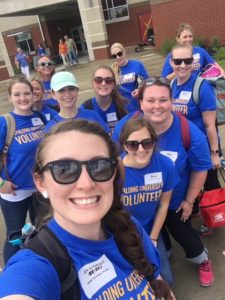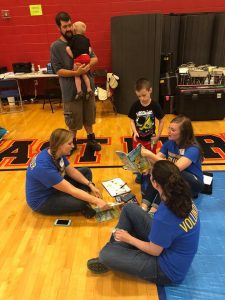A group of doctoral students and faculty from the Spalding University School of Professional Psychology spent last weekend learning and helping at the same time.
Ten students from Spalding’s Doctor of Psychology in Clinical Psychology program (PsyD), along with faculty members Drs. Norah Chapman and Amy Young, volunteered to provide information and mental health services while also conducting research at the Remote Area Medical free clinic in Hazard, Ky.
The RAM mobile clinics provide free medical, dental and vision care to underserved or uninsured individuals. The Spalding PsyD volunteers helped add mental health services to the fold in Hazard.
Chapman said the PsyD volunteers worked in three roles at the RAM clinic: staffing an informational table to explain about good mental health practices, performing direct interventions and brief counseling with clients, and providing integrated care with the dentists. They helped calm patients – including many who’d not seen a dentist in years or ever – as they received extractions, fillings and other procedures.
The Spalding volunteers interacted with more 200 clients and patients over the weekend, Chapman said, and for some of the newer PsyD students, it was their first experience working directly with clients.
“This is really the pinnacle of our training programs – research intervention, integrated health care and serving underserved populations,” Chapman said. “It was an incredible experience.”
Chapman said the Spalding volunteers tried to explain to clients and patients the importance of mental health services and to put them at ease about talking to a professional about their concerns and needs. She said some had faced physical trauma; felt anxiety or stress over family or financial issues; or were battling addiction.
Chapman said some of the visitors thanked Spalding’s volunteers for being there and told them they wouldn’t otherwise have had access to mental health services where they live. Chapman said several of visitors there had never previously talked to a mental health professional.
Spalding PsyD student Autumn Truss said it was “truly inspiring” to see the range of health providers from the across the country come together at the RAM clinic to serve the “resilient population of Eastern Kentucky.”
“Partnering with RAM to provide free mental health services was the perfect opportunity to help this underserved population and carry out Spalding’s mission as a compassionate university,” Truss said.

